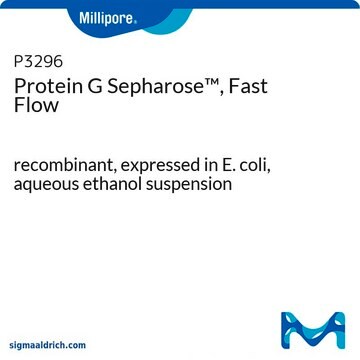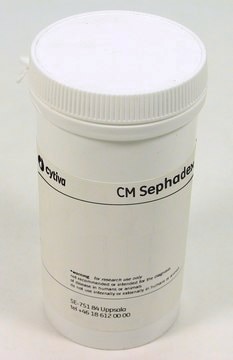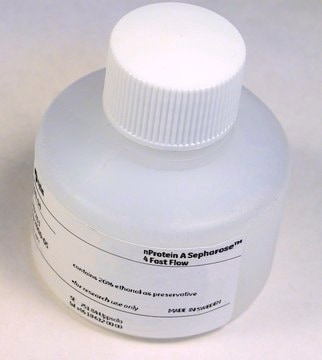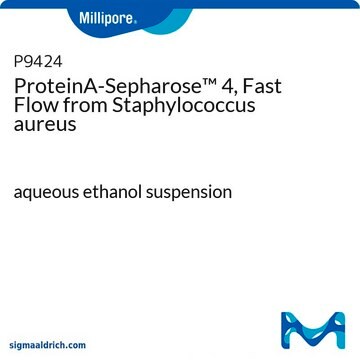GE17-0618-05
Protein G Sepharose™ 4 Fast Flow
Cytiva 17-0618-05, pack of 200 mL
Synonym(s):
Fast Flow resin, Antibody purification resin, IgG purification resin
About This Item
Recommended Products
ligand
recombinant protein G lacking albumin-binding region
packaging
pack of 200 mL
manufacturer/tradename
Cytiva 17-0618-05
storage condition
(20% Ehtanol)
matrix
4% cross-linked agarose
average diameter
90 μm (d50v)
cleaning in place
2-10
working range
3-9
suitability
suitable for bioprocess medium
storage temp.
2-8°C
General description
Protein G Sepharose™ 4 Fast Flow has recombinant protein G immobilized by the cyanogen bromide (CNBr) method to Sepharose™ 4 Fast Flow. Protein G exhibit binding specificities that complement Protein A media and binds to the Fc region of IgG from a variety of mammalian species. Protein G Sepharose™ 4 Fast Flow may be used to isolate and purify classes, subclasses and fragments of immunoglobulins from any biological fluid or cell culture medium.
As member of the BioProcess media range, Protein G Sepharose™ 4 Fast Flow meets industrial demands with security of supply and comprehensive technical and regulatory support.
Features and Benefits
- Binding specificities that complement Protein A media.
- Binds a broad range of IgG species and subclasses.
- Multi-point attachment minimizes ligand leakage.
- Used in a range of research applications.
Storage and Stability
Analysis Note
Legal Information
Signal Word
Warning
Hazard Statements
Precautionary Statements
Storage Class Code
3 - Flammable liquids
Certificates of Analysis (COA)
Search for Certificates of Analysis (COA) by entering the products Lot/Batch Number. Lot and Batch Numbers can be found on a product’s label following the words ‘Lot’ or ‘Batch’.
Already Own This Product?
Find documentation for the products that you have recently purchased in the Document Library.
Customers Also Viewed
Articles
Purify monoclonal or polyclonal IgG from serum, cell culture supernatant or ascitic fluid using the HiTrap Protein G HP from Cytiva, an affinity-exclusion chromatography product containing Sepharose-immobilized Protein G.
This page describes immunoprecipitation (immunoaffinity or pull-down techniques).
This page describes efficient column packing and preparation for affinity chromatography of antibodies.
This page shows how to convert between flow velocity and volumetric flow rate in affinity chromatography of antibodies.
Protocols
This page provides information about different pull-down assays for the further isolation of multiprotein complexes to identify their components with products from Cytiva.
This page shows how to separate IgG antibodies by affinity chromatography using Protein G Sepharose 4 Fast Flow from Cytiva.
This page shows how to prepare samples for purification with affinity chromatography.
Our team of scientists has experience in all areas of research including Life Science, Material Science, Chemical Synthesis, Chromatography, Analytical and many others.
Contact Technical Service











